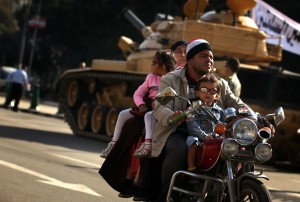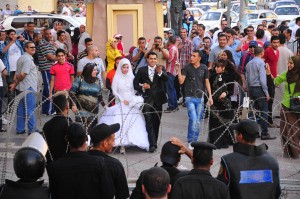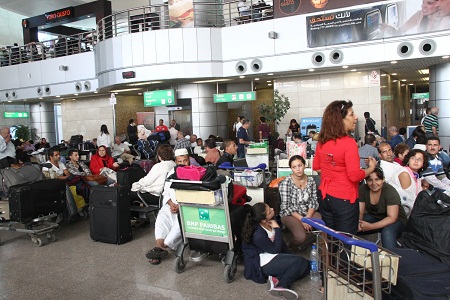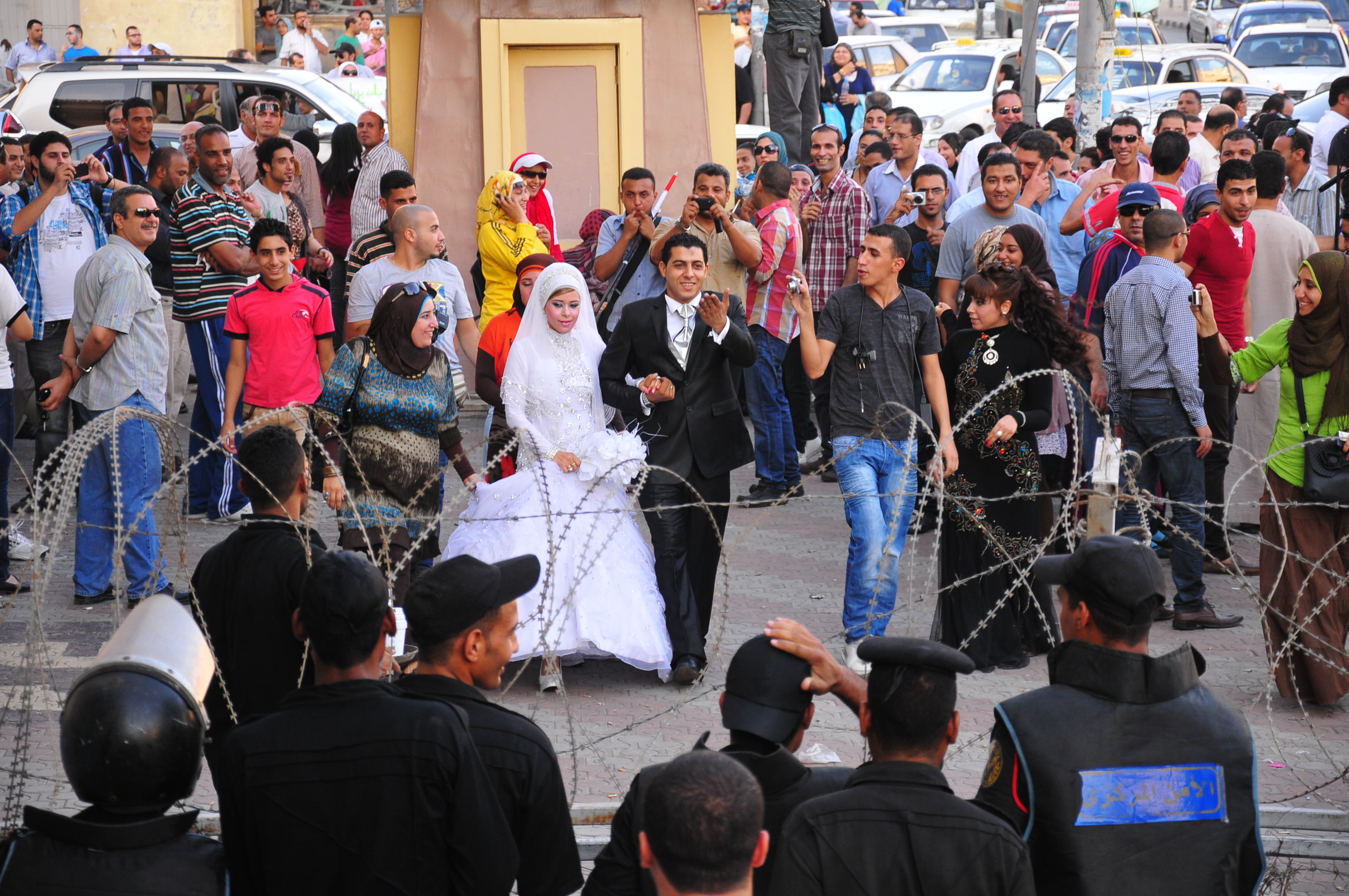
AFP- Patrick Baz
There is no doubt that the revolution has created political dynamism that did not exist before it. It has caused the Egyptians to become more politicised than at any time before with indicators of political participation in elections and referenda attesting to that.
Differences in ideologies and political views we never knew existed floated to the surface when the revolution hit us after living under an authoritarian regime for 30 years.
Two currents are in competition; a hope for extending the revolution’s principles (bread, freedom, social justice and human dignity) and values to the marrow of our society and a desperate attempt to crush the revolution, rebuild the old regime and maintain its corrupt institutions.
Political affiliation and ideology have become important. Egyptians have been categorised and labelled. There is the “sofa party” (those who watch TV and don’t participate in politics), leftists, revolutionary socialists, liberals, secularists, Islamists, Salafis, Muslim Brotherhood, Hazemoon (supporter of Hazem Salah Abou Ismail), 6 of April, feloul (remnants of the old regime) and revolutionaries.
The categories may overlap and in one family you might have shades of all these labels. A father could be feloul while the children are revolutionary and the mother is apathetic.
Despite claims that Egyptian society has not changed, the witnesses of the last two years would disagree. Change in households seems to happen gradually. Individuals and families have experienced a lot, ranging from stress to financial crises to thoughts about leaving the country. Some, however, have capitalised on the chaotic reality and turned risks to opportunities.
Tying the knot
They held hands as they walked from the Metro station to a nearby cafe. They sat down and ordered tea and coffee. He passed her the sugar and patted her shoulder, making sure she was comfortably seated. He adjusted his seat and asked her to tell their story.
“With parliamentary elections looming, I heard of a group called Ehmi Soutak [protect your vote] working on raising awareness on political participation. So I decided to go their meetings in Maadi, that’s when I first met him,” says Doaa, 24, describing her first meeting with her now husband Mohamed Adel, 30, a lawyer.
Doaa’s family are members of Muslim Brotherhood supporters and she believed in the purity of the Brotherhood. “During one of the discussions in the group someone said that the Brotherhood were like the National Democratic party of Mubarak, so I got defensive and rebuked his criticism, that when Mohamed spoke and clarified his critical point of view of the Brotherhood,” she continues.
They both attended Ehmi Soutak’s heated discussions and they fell for each other over the next few months.
“I dreamed of meeting someone from Tahrir Square. Someone who believed in the values of the revolution, active and independent and there she was. Doaa came on her own, no brother or girlfriend, she attended the sessions, and expressed her thoughts,” says Adel.
The revolution bridged the gaps and provided ground for like-minded youth to congregate, exchange ideas and work together. Adel and Doaa’s marriage is not the only one that sprung out of the revolution; many others met in the square during demonstrations and later on in newly born political parties and campaigns. Numbers and statistics are not available, but anecdotal evidence suggests the number is not small.
Over next few months, Adel and Doaa found many commonalities between themselves, got along well and decided to take the next step.
“We once had a huge argument about the Brotherhood so I hid the truth about my family from him for the last few months knowing how critical he was of the Brotherhood.
“But before our relationship got serious, I had to tell him that my family were members of the Brotherhood. I waited for him to be put off. But he wasn’t. He told me ‘I don’t care what your family thinks, your opinion is what matters,’” says Doaa, grinning.
“Doaa is originally from Mansoura, Dakahliya. If it weren’t for Ehmi Soutak we wouldn’t have met. We do owe it to the revolution really,” says Mohamed.
Handling differences is hard
Ayman, 23, is a newly-graduated engineer. His problem exists in many families. His father supported the Supreme Council of Armed Forces (SCAF) and the Brotherhood afterwards, while Ayman aligns with the revolution and its values and demands.
“At the beginning of the revolution, our family unanimously supported the protests, but the disagreement started with the referendum on the constitutional amendments and the SCAF’s stance.
“The first big clash was about virginity tests that the SCAF forced on girls in Tahrir. I believed they happened, but my dad denied it, blaming the people for messing with the army; the only remaining institution that could hold the country together,” he says.
According to Ayman, before the revolution people were either against Mubarak or indifferent. His family used to sympathise with the Brotherhood because they were the sole organised opposition. Nevertheless, Aymen changed his view of the Brotherhood after the revolution, when it became apparent to him that they only cared about their self-interest. He clashed with his father again when President Morsy assumed power.
“He is convinced that we need stability and that they [the Brotherhood] will bring it. I understand that his work is affected and they provide a partial solution, but he joined demonstrations supporting them, while I blatantly opposed them,” says Ayman.

Hassan Ibrahim
Every time Ayman starts a discussion with his father they end up in a fight or heated argument. “We let time pass by and we avoid discussion. We talk about education or work, but you can’t really fake normalcy. Our interaction is affected because deep down we are avoiding the source of our differences; politics,” he says, chuckling at himself.
Ayman speculates that a generational gap might explain with the constant disagreement with his father. His father sees him as impetuous. “My father’s generation could be satisfied with slow change. Our generation wants fast change. I mean in the next ten years Egypt could be different if we had a vision,” he says earnestly.
Ayman’s case is not uncommon, in some other families the categories (Brotherhood supporter versus revolutionary) differ, but the predicament is similar.
Ayman believes the problem it is not merely a difference in opinion or political ideology. He says: “It’s hard to for me to see my dad accepting injustice and it’s hard for him to see his son ready to jump out every time there is a demonstration or take uncalculated risk.
“An incident like the virginity tests was about human beings, injustice, dignity and respect. When our differences concern these values, that’s when it becomes very hard to deal with our differences.”
Crisis at work, crisis at home
The economic ramifications of the revolution have impacted many businesses, small and large alike. Tharwat El Sannan is a general manager of Ebony and Ivory for interiors and office furnishing. Like many other businessmen and entrepreneurs, his company’s financial crisis has extended to his household.
“The revolution has impacted our work because we’re working in furnishing and it needs investment, domestic and foreign. Instability and the lack of political vision and a clear economic ideology for the country diminished investment,” says El Sannan.
El Sannan’s young company implemented a contingency plan to circumvent negative impacts on its employees and workers. His company stopped importing raw materials and focused on local manufacturing for the past two years. “We need to save foreign currency on the one hand and involve the Egyptian workforce more on the other,” he adds.
El Sannan’s household was impacted greatly by his company’s shrinking profits. He explains that the problem is recurring in many households which put more burdens and stress on parents. With repayments to be made he is now facing hardships paying for this from his income.
He says: “I have financial commitments like making instalments, tuition for private colleges and schools. Some spending behaviours changed accordingly, eating out, clothes shopping. Unnecessary spending has been cut down for my family and I.”
El Sannan believes that having the Brotherhood in power is worsening things and causing political conflict and compromising the judiciary’s role, making the environment for business hostile and volatile.
The impact of the financial crisis that hit Egypt’s economy after the revolution is worse for the working class, including small vendors. Om Sayed, 59, sells stationary next to Tahrir Square. Her small business has been affected greatly by protests and the lack of security in general.
“My husband and I have lost all our savings over the past two years. We haven’t been paying rent for two years, but the landlord has been understanding because he knows we can barely afford to buy food.”
Om Sayed has a family of five and even though some of her children are married, she still has to contribute money to her sons to pay for her grandchildren’s school. “Before I used to buy my merchandise in bulk, now I buy enough for one day at a time,” she adds.
“We are tired…we know God is there for us, but we want the country to calm down.”
Political activism strikes
One thing noticeable about society at the moment is the rising level of political activism. Political participation, whether formal, through engaging in parties and voting in ballot boxes, or informal, through participation in movements and protests, has increased in comparison with political participation under the Mubarak regime. The voter turnout for first parliamentary elections after the revolution was over 60% and for the presidential elections was nearly 50%.
Political events are the core of everyone’s conversations; at work, at university, on the street and at home. Many who were not involved politics are now. The number of political parties has jumped from about 24 before the revolution to more than 60 parties in 2012. A countless number of informal youth political groups and movements emerged such Misrna (our Egypt), the Revolution Youth Coalition and 25 January Youth movement. The number of civil society organisations proliferated reaching about 36,000 organisations in 2012.
Emad Mishriki is a professor at Tanta University. Mishriki was a human rights activist, but residing outside the capital prevented him from fully engaging in politics. However after the revolution many breakthroughs took place. He participated in events that followed the revolution; Friday marches, demonstrations and then running as a candidate in the first parliamentary elections after the revolution.

Mohamed Omar
He says: “The revolution left its mark on my family and I. I took my daughters to Tahrir Square twice during the 18 days of the uprising. My son went to his school and joined the popular committee with his teachers to protect the school,” he remembers.
“Then in March 2011 the idea of establishing a political party crystallised and we established the Egyptian Social Democratic Party, opened an office for it in Gharbiya where I became the deputy of the party for three governorates in the middle delta [Monufiya, Gharbiya and Kafr El Sheikh],” says Mishriki.
Mishriki’s political participation was further enhanced with his candidacy in the first parliamentary elections after the revolution. “I ran for elections with two goals in mind: to stimulate the good elements in our society to be politically involved and to encourage Christians to participate, especially following the Maspero incident after which Copts felt like escaping the country,” he explains.
Mishriki’s involvement in politics was generally reflected on his family who have been supportive of his decision to run for elections. “My wife and two daughters have been active in my campaign. My mum has been following the posters that had my pictures on the street. She used to be sad when some of them were sprayed and ruined by my competitors,” he says proudly.
To leave, stay or return?
Some young people and families got scared and frustrated by the chaos so they decided to leave the country. Other Egyptians abroad saw an opportunity to contribute their expertise to stabilising the country so they decided to go back. Yet more are waiting for the right moment to come back. Tamer Elleisi, 34, is an advisory consultant in a large bank in Canada.
He started the immigration process in 2008. He has been working in the banking sector for a while and wanted to further his experience. So his destination was Canada. But then there was the 25 January revolution.
“I was active in the revolution starting 28 January. Those days our solidarity peaked like no other. We were unified behind one goal,” He reminisces.
He got his visa in March 2011, but decided to stay for a while longer. “Although there was, and still is, a need to be active on the streets while the friction among the political parties prevailed.
“When we needed technocrats for our first government after the revolution, there were not enough. This is when I felt we needed to focus on building our capacities to maximise our benefits and diversify our efforts outside of politics,” he says.
Tamer is currently in Canada doing what he believes will benefit Egypt five or six years from now. He explains: “Now there isn’t much we can do amid the friction, the ad hoc reactions and the visionless political debate. We have been running around in circles without a vision, therefore we need to prepare the second row of young professionals who can handle the critical sector when they are needed.”
“I’m very optimistic and therefore I’m not escaping. On the contrary, I have a stronger reason to go back and add value,” he says.
The final straw
Mona Amer is an assistant professor of psychology at the American University of Cairo. She comments on the myriad of changes that affected individuals and families.
“After the revolution it is only natural that people face anxiety aggravated by new stressors that increased the stress and tension already existing from the accumulation of old stressors. These new stressors include financial stressors, concerns regarding safety and security, fear of the unknown future caused by the socio-political turbulence,” she says.
Amer hands out a questionnaire to her clients, especially couples, to assess the issues they disagree about. “After the revolution I had to add politics because it was recurrent during therapy sessions,” she adds.
She clarifies that difference in opinions and debate within the family is a healthy thing. Discussions might grow into conflicts because people perceive opinion as something indicative of values and principles. She says: “It is not only about adopting a political ideology or supporting a party or group, but it is about what it means and the deeper meaning it carries for others.”
She explains that when people refuse to accept opinions other than their own it is because of confirmation bias; a tendency to surround themselves with likeminded friends, only accept information that confirms their existing beliefs and block out anything that challenges their beliefs.
She concludes: “People may become emotional because what’s at stake is a country they love and a future they care about.”
The events of 25 January 2011 have impacted us, but only time will prove if what happened was a full-fledged revolution or not. However, mere observations show that two years ago, the bigger portion of our society was politically stagnant.
Today, that’s not the case anymore. On a macro level so much is taking place in the political and economic scene. On a micro level, many Egyptian families have experienced change starting from what they watch on TV to acquiring more financial burdens. It is hard to predict what might have happened if the revolution did not take place, but one thing for sure is that its social ramifications are still unfolding. Change is happening, be it negative or positive, only the future will tell.
Names have been changed to protect privacy


